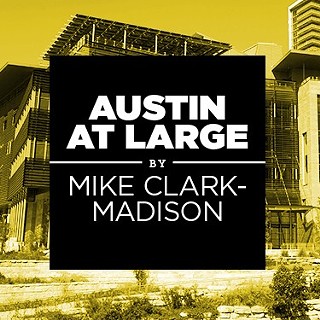Austin at Large: And Still, We Rise
Austin has liberated itself from exhausted narratives before. It’s time to do it again.
By Mike Clark-Madison, Fri., June 12, 2020
June 7 was already an important date in Austin history. Now it deserves to be a civic holiday.
Thirty years ago, in 1990, June 7 marked the Barton Springs Uprising, or PUD Night – when more than 1,000 Austinites, flooding a City Council hearing that lasted 13.5 hours until nearly 7am, laid down the law: Austin's natural and environmental heritage is not to be spoiled and plundered, and the people will defend it at great cost. It was, to pardon the now-timeworn pun, a watershed moment.
There are whole books and movies about the movement that led to and followed from that evening's protest, for those who need the backstory. The symmetry that led to another massive flood of pain and rage washing over a Council meeting, this time through technology, and then to one of Austin's largest protest marches ever on June 7, 2020, is of course accidental and tragic. But there are parallels to acknowledge and, perhaps, take heart from – signals we can heed as we rise to this occasion.
Liberation of the Land
PUD Night (referring to the Barton Creek planned unit development that was before Council for approval) was neither the beginning nor the end of the story of how environmental stewardship became a core Austin value. Today, most of the stakeholder communities who fought most fiercely against the movement (the state, especially its road builders, remain a difficult exception) accept that some outcomes are simply not allowed no matter what and that the unique Central Texas landscape is part of the whole world's natural heritage, and thus a huge asset to our city and not a barrier. The new Chamber of Commerce CEO comes from one of the region's largest environmental players. The Barton Creek community itself is now trying to detach its fortunes from the golf-course-and-McMansion model that defined its PUD, because nobody wants that anymore.
But the 15 years (at least) before PUD Night featured an insurgency to defend the landscape that a lot of Austinites – the guardians of mainstream thought and power – refused to join. There was much fealty pledged to "managed growth," and many compromises in which activists – understood in the mainstream as a finite set of transgressive wackos – got little as the supremacy of moneymaking endured. PUD Night was when that began to change, when reform was no longer enough, when the safety of the land became the goal of a struggle for liberation from an old, dead power structure, and when that struggle was joined in spirit and at the polls by enough people to flip the old script entirely by the end of the decade.
Because we are now all 30 years older, we can see that story's limitations as a narrative of revolution. The movement was largely a dispute between white people, the insurgents of then being the mainstream of today, and its character of class struggle has largely dissolved. Care was needed then and still needed now in how one juxtaposes the needs of the birds and trees and creeks and salamanders and cave bugs with those of Black bodies and the lives of the poor, the marginalized, the sick, and the murdered. But the ground is again moving beneath our feet.
The End of Occupation
As we redefined the safety of the land back then, we are quickly redefining "public safety" now to mean something that's incompatible with the established principles and practices of the Austin Police Department. Reform is no longer enough: What is needed is liberation. How far does that go? That's up to us and still to be seen, but the forces that would hold back a tsunami of transformational change – be it removing APD leadership, whacking $100 million or more from its bloated budget, or more – are probably, right now, not strong enough to do so.
People who have not thought or learned much about abolition, decarceration, and decriminalization are naturally startled and knocked back by calls to disarm, defund, and disband a police force. That doesn't mean they don't agree – even if they've said before that they want reforms that would actually increase police funding and power, even if they're reflexively cringing from the attack ads they see in their future, even if they couldn't before say Black Lives Matter and mean it the way it's intended to be heard.
People understand that policing – the tasks that people in a community perform to safeguard themselves and each other - does not require a police force that cannot divorce itself from the relentless and enticing desire to be an occupying army, the same calls issuing from the bunker below the White House. Sorry, "good" cops of Austin and elsewhere, but people no longer believe that police are by definition community servants whose values are the same as ours. This community, and many others, do not value violence as an outcome to be normalized the way too many officers do and are told to do by the chief, the union, and their racist friends.
We do not find meaning and purpose in the privilege that police want us to read as heroism, the inequity and power imbalance they shriekingly demand we not only accept but hand over to them with gratitude. We pay an enormous price to be treated badly and, for too many of us, to be traumatized by a regime of fear. June 7 is the day a new story, a new narrative, was taken up by the people of Austin. There's no going back.
Got something to say? The Chronicle welcomes opinion pieces on any topic from the community. Submit yours now at austinchronicle.com/opinion.







